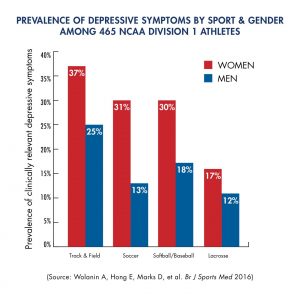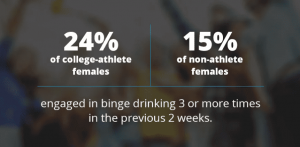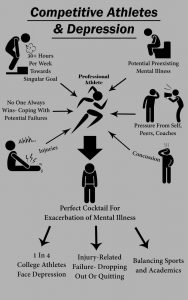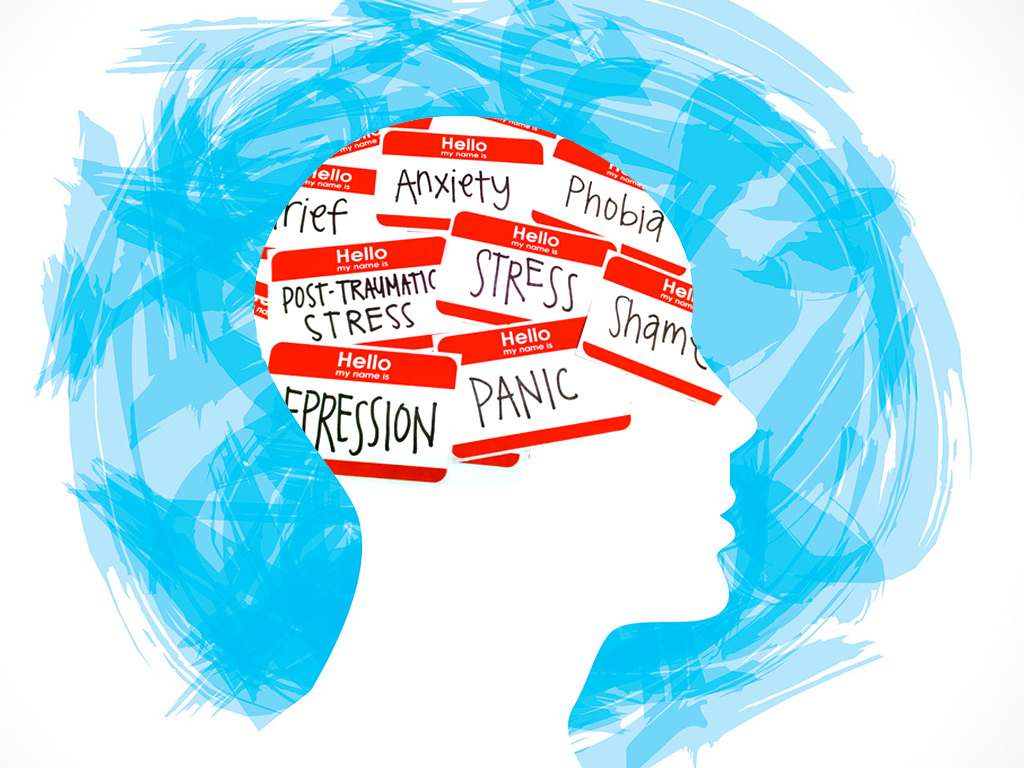
Scientific studies about athletes and their mental health are becoming more well known to millions around the world. Elite athletes face intense competition and pressure, due to demands for them to be the best, the smartest, the fastest, and the strongest. As a result, thirty-five percent of professional athletes struggle with mental health issues of depression, anxiety, and other mental health conditions. It has been shown by the Oklahoma State University kinesiology department that for most athletes, performance struggles, pressure, trauma, and injuries are likely to contribute to struggles they may develop with their personal image. Many studies have been conducted by scholars all around the world to try and explain the reasoning behind why these athletes feel the way they do.1 Dr. Felipe Baretto believes that most of these athletes struggle with Overtraining Symptoms (OTS)2 rather than actually developing cases of depression, while other scholars, such as Alie Louie believe that everything that goes into being an athlete, such as training, injuries, performance failure, and sometimes even balancing an athlete’s education with competitive sports, can cause feelings of depression.3 What I argue below is the need for athletes to deal with mental health issues in order to create a positive environment in their world of athletics and competition, so that mental health can become a normalized topic within the community of coaches, trainers, and other external resources such as rehabilitation centers and counseling centers.

An assessment was conducted by Thomas Hammond, MSc, on high-level competitive swimmers who were competing to represent Canada internationally. Many researchers used semi-structured interviews to study the prevalence of diagnosed failure-based depression, as well as self-reported symptoms of depression using the Beck Depression Inventory-II diagnostic. With a total of 50 varsity swimmers, 22 being females and 28 being males, leading up to competition time, 68% of athletes met the criteria for having a major depressive episode. Female athletes experienced depression at a higher rate than their male counterparts. Males experienced this rate of mental health issues at about 25% while females tend to be more susceptible to mental health issues at about 30%.4 As the competition concluded, 34% of athletes met the diagnostic criteria for depression, and 26% self-reported mild to moderate symptoms of depression. The criteria include 21 items measuring depressive episodes among the emotional, cognitive, motivational, and physiological domains of depression.5 When the athletes were re-evaluated, the prevalence doubled. There was a significant positive correlation between performance failure and depression in this group. Depression was more common in those who did not meet their performance goals. It was found in this scientific study that depression among elite athletes is higher than what had previously been reported due to the evolution of athletes compared to past generations.
Mental health among athletes is beginning to make its way into the spotlight, spreading awareness for athletes all around the world. Individuals finally obtain an opportunity to understand everything that may cause an athlete to have feelings of anxiety, depression, and both physical and mental trauma. Dr. Felipe Barreto examined and evaluated the risk factors associated with depression including injuries, performance decline, and catastrophic performance in athletes compared to the prevalence of depression in comparison to non-athletes. Dr. Felipe Barreto explains that there is a crucial difference between the increased prevalence of depression and the increased prevalence of elevated depressive symptoms. Several criteria highlighted by the Mini-International Neuropsychiatric Interview and the Structured Clinical Interview point to the diagnosis of Major Depressive Disorder (MDD). Dr. Baretto relies instead on studies that do not use diagnostic instruments to assess depression severity, but instead, uses resources such as the Center for Epidemiology study’s depression scale and Beck Depression Inventory.6 In spite of all of these different evaluations, bipolar disorder, popularly known as BD, is not a factor in the diagnosis of depression. For the most part, the general public often believes that both depression and bipolar disorder correspond to one another. But actually, Bipolar Disorder and Depression are tested differently and evaluated through different tests.
Mental health hasn’t always been a topic that the public has been concerned about. However, in recent times, athletes are becoming more vocal about their struggles with their mental health journeys. There has been a change in the way mental health issues have been perceived due to the growth of society and the change in generational attitudes. Several elite athletes have opened up about their mental struggles, such as Unites States gold medalist winners Michael Phelps and Gabby Douglas. In 2014, Michael Phelps, the record-breaking American swimmer, pled guilty to a second DUI (Driving under the influence). His struggle with depression and anxiety led him down the path of substance abuse, landing Phelps in a rehabilitation center.7 “Drugs were a way of running from whatever it was I wanted to run from.” Trauma, pressure, and the dedication of working too hard are mentally and physically exhausting. Michael now has a documentary, The Weight of the Gold, discussing his struggles and why he did some of the things he did, and how mental health is a lot more common than people may realize in professional athletics. American gymnast and three-time gold medalist Gabby Douglas is one of the greatest gymnasts of all time. Douglas competed in her first Olympics at the age of sixteen, one of the youngest gymnasts to ever compete at such a competitive level. Since 2012, Gabby has been under the spotlight in the gymnastics world. As Gabby was competing in the 2016 Rio Olympics, she received tons of backlash for her performance in the Olympic finals. To this day Gabby has been open to the press about how positive mental health is the key to success. “I’ve been trying to stay off the internet because there’s so much negativity.”8 She even defended tennis player Naomi Osaka after she dropped out of the 2021 French Open in order to protect her mental health. Gabby told People Magazine: “Being an athlete we go through so much already. If you need to step back, that’s what you need to do.”9 Gabby has elucidated to the world the effect that negativity can bring to an athlete and to one’s self-image, as well as the way one views oneself. Judgment is always there when you are one of the top athletes in the world. One of the best women’s tennis players of all time, Serena Williams, opened up about her struggles on social media due to her three straight loss sets. Due to the backlash she received from the losses, Williams came out with a statement regarding her postpartum depression from giving birth to her daughter just a year before this competition. Standing from the outside looking at these elite athletes’ lives, we don’t realize that some of these people are just like everyone else and have personal issues that are normal. “Talking to my loved ones made me realize that my feelings are normal.” Williams stated that she was in a “funk” due to feeling like she hasn’t been a good enough mother to her daughter.10 These were all emotions that every new mother may feel. UFC star wrestler Ronda Rousey also opened up about her struggles with suicidal thoughts due to failure. In 2015, following her loss to UFC fighter Holly Holm, Rousey revealed that she felt “nothing” if she wasn’t a champion. She opened up to Ellen Degeneres about the stigma of talking about everything suicidal and making it more acceptable for people to talk about it and not feel ashamed of themselves. “It’s something real people are going through.” From the spotlight, athletes are often ridiculed when they make errors or go through something, when, in reality, that is something that a lot of normal people also go through.

Being in the spotlight as an elite athlete exposes the athlete to both wanted and unwanted criticism from the world, from coaches, or from other elite athletes. People judge athletes on their character, performance, where they came from, how they got there, how they should be performing, and whether they live up to what the world expects of them. Being an elite athlete comes with a lot of misconceptions. The most well-known misconception is that only mentally and emotionally strong athletes will succeed and be able to compete at the highest level. Due to this stigma, MHD (mental health disorder) is continuing to get overlooked. With the commitment that goes into the daily life of being an athlete, athletes are more vulnerable to mental health problems than many not in the spotlight may see. There have been many athletes in history who have struggled with mental health, and as a result, they often turn to drug abuse, alcoholism, and other self-destructive behaviors. Some of the reasons they may misuse drugs or alcohol can be for various reasons. According to author Emily Guarnotta, performance enhancements, dealing with pressure, running from physical injuries, and coping with mental illnesses are all reasons an athlete may feel the pressure to use these substances.11 The most commonly known performance-enhancing drugs used among athletes are Anabolic steroids, which are a form of testosterone known to aid the building of muscle groups making these athletes stronger unfairly and unnaturally, to put them ahead of future competition.12 Around 9% of professional football players and 67% of competitive bodybuilders have used steroids at some point in their career to cheat their way to be the best in their occupation. These athletes are relying on these steroids to help their performance; but the use of these steroids can cause both mental health problems as well as health issues such as kidney failure, liver damage, and tumors.13 Professional cyclist Lance Armstrong is one of the world’s best-known cyclists, but today he is not remembered as a great cyclist but as someone who consumed steroids to win the Tour de France and was subsequently stripped of his titles. Alcohol is another substance that athletes consume. Athletes are known to drink alcohol to reduce anxiety and enhance performance. There is little evidence to prove that drinking alcohol can reduce anxiety before an important match or game, but it is still a leading cause of substance abuse among elite athletes. In fact, constant drinking can lead to hindered performance.

71% of college athletes participated in drinking throughout the year. Professional baseball player Josh Hamilton is a top athlete that is known for his history of alcoholism throughout his professional career.14
With all these hardships and pressure, these substances are more harmful than helpful. If athletes are struggling internally with mental health and substance abuse, there are many programs offered today that they can go through to clear themselves of all the negativity that substance abuse brings. Athletes are welcomed to inpatient treatment programs where they live in a facility to detox and deal with their struggles with whatever they may feel worried about and the pressures they may feel. There are also outpatient treatment programs where they can attend several hours a week and return to their homes after the treatment. It’s not common to hear elite athletes attending these programs, which is due to the stigma surrounding mental illness and the embarrassment they feel for seeking help. The importance of getting help when help is due is very important to one’s life and mindset when going through something that may feel inescapable. Professional basketball player Dennis Rodman opened up about his denial of alcoholism and later entered himself into a rehab facility to “decompress all the things I was going through.”15 Dennis continues to fight through relapses by getting the help he needs through this facility. Being an athlete is going to come with obstacles that may be different compared to the general public, but being honest with one’s struggles needs to be at the top of one’s priorities. The world and past generations need to make mental health not a weakness but a positive opportunity for evaluating oneself. By allowing oneself to show weakness, others will tend to respect you. Individuals who are comfortable with themselves and their emotions tend to be more respected in this generation compared to someone who acts like they are not fazed by anything that life may throw at them. Everyone goes through their own journey but the way we deal with situations will define a person and their potential to be a great athlete.
Being an athlete includes a lot of time, dedication, strength, devotion, and even sometimes schoolwork. All these are leading causes of extra stress that may be added to an athlete. According to The Gale Encyclopedia Of Public Health, stress is defined as an organism’s total response to physical, mental, emotional, or environmental demands of pressure. One study found that about 75% of those surveyed reported experiencing some sort of stress in the previous two weeks.16 Even more concerning is that 95% of male athletes and 85% of female athletes report higher stress compared to 52% of non-athletes.17 Mariya Shiyko concluded that from her studies and surveyors, athletes report higher stress in romantic relationships, higher responsibilities, decreased sleep, and extracurricular activity demand. Stress is so high in these athletes due to everything that is needed to balance an athlete’s life. As most athletes’ lives revolve around their sport, making time for everything equally is what causes most of their problems. Athletes struggle with managing their time, leading to deteriorating relationships within their personal lives, which may lead to depression and stress due to not having enough time to grow these personal relationships. When depression comes along with stress, coaches begin to notice a performance fall within these athletes. Despite doing everything they need to do, some elite athletes fail to realize how much their mental health may suffer as a result of working a daily routine. The best way for athletes to cope with stress is to take part in something they find relaxing, such as yoga or taking a night out with their favorite people. On the field, athletes are at their best when they work on themselves, but away from the field, they are not always as effective.

I’d like to thank Dr. Bradford Whitener for working with me so patiently and efficiently. Without him, this article wouldn’t be where it is right now. His passion and his positive energy for history and for teaching truly reflects on me as a student. I would also like to thank my parents for all the endless support that they graced me with throughout this writing process. Finally, I would like to thank you as readers for taking the time to read and educate yourself about a topic that is so near and dear to my heart through this article.
- Zachary Y. Kerr et al., “College Sports–Related Injuries — United States, 2009–10 Through 2013–14 Academic Years,” Morbidity and Mortality Weekly Report 64, no. 48 (2015): 1333. ↵
- Felipe Barreto Schuch, “Depression in Athletes or Increased Depressive Symptoms in Athletes?,” Current Sports Medicine Reports 14, no. 3 (June 2015): 244. https://doi.org/10.1249/JSR.0000000000000151. ↵
- “Mental Health and Athletes,” Alie Louie (blog), (February 21, 2020) https://alisonlouie.plymouthcreate.net/uncategorized/mental-health-and-athletes/. ↵
- “The American College Of Sports Medicine Statement On Mental Health Challenges For Athletes” ACSM_CMS, (August 9, 2021) https://www.acsm.org/news-detail. ↵
- Thomas Hammond et al., “The Prevalence of Failure-Based Depression Among Elite Athletes,” Clinical Journal of Sports Medicine 23, no. 4 (July 2013): 273. ↵
- Felipe Barreto Schuch, “Depression in Athletes or Increased Depressive Symptoms in Athletes?” Current Sports Medicine Reports 14, no. 3 (June 2015): 244. ↵
- Susan Scutti, “Michael Phelps: ‘I Am Extremely Thankful That I Did Not Take My Life,’” CNN, (January 19, 2018): 1. ↵
- Gavin Evans, “Gabby Douglas Responds to People Who Criticized Her on Social Media During Rio Olympics,” Complex (website) (August 15, 2018), https://www.complex.com/sports/2016/08/gabby-douglas-responds-people-criticized-her-social-media-rio-olympics. ↵
- Jen Juneau. “Gabby Douglas Shares Support for Naomi Osaka, Says Last Olympics ‘Really Did a Number on Me,'” People (website), (June 14, 2021), https://people.com/sports/gabby-douglas-supports-naomi-osaka-after-2021-french-open-withdrawal/. ↵
- Erin McDowell, “12 Athletes Who’ve Spoken About Their Mental Health Struggles,” Insider, June 6, 2021, https://www.insider.com/athletes-mental-health-struggles-depression-2021-6. ↵
- Emily Guarnotta, “Alcohol and Drug Abuse in Athletes,” Recovery (website) (July 15, 2022). https://recovery.org/addiction/athletes/. ↵
- National Institute on Drug Abuse, “Anabolic Steroids DrugFacts,” National Institute on Drug Abuse, (August 12, 2018), https://nida.nih.gov/publications/research-reports/steroids-other-appearance-performance-enhancing-drugs-apeds/introduction. ↵
- National Institute on Drug Abuse, “Anabolic Steroids DrugFacts,” National Institute on Drug Abuse, (August 12, 2018), https://nida.nih.gov/publications/research-reports/steroids-other-appearance-performance-enhancing-drugs-apeds/introduction. ↵
- “The Truth about Josh Hamilton’s Addiction,” Turnbridge, (June 3, 2015) https://www.turnbridge.com/news-events/latest-articles/the-truth-about-josh-hamiltons-addiction/. ↵
- “Top 15 Athletes Who Have Gone to Rehab,” The Sportster (website), (March 14, 2015), https://www.thesportster.com/entertainment/top-15-athletes-who-have-gone-to-rehab/. ↵
- Rebecca J. Frey, Tish Davidson, and Laura Jean Cataldo, “Stress,” in The Gale Encyclopedia of Public Health, ed. Laurie J. Fundukian, vol. 2 (Detroit, MI: Gale, 2013), 887. ↵
- Christine Dimestico, “Identifying Stress Unique to College Athletes: Health Outcomes & Interventions,” RISE:2022 (blog), 2022. https://www.northeastern.edu/rise/presentations/identifying-stress-unique-to-college-athletes-health-outcomes-interventions/. ↵




44 comments
Dallasstar Johnson
This article was so eyeopening. I’m an athlete myself so it’s comforting to read an article that shows insight on what it actually means to be an athlete. Athlete’s mental health is sometimes overlooked or not tended too enough because themselves, and/or other people put more emphasis on their physical abilities, rather than prioritizing their emotions; completely neglecting the struggles athlete’s face that cannot be seen.
Franchesca Tinacba
I truly believed this article was planned out and written so well based on the amount of statistics and research backing up the claim of the article. As someone who is not an athlete, I don’t completely understand the struggles of balancing academics and sports. It makes me sad to see how many people are struggling through so much physical and mental exhaustion. I sincerely think that this article will shed light on how important mental and physical health is for everybody.
Quianna Wynn
I recently watched a movie called “Just Wright” and it touched on the topic of what depression looks like and the pressure they experience based on their inability to essentially do their job. I think tat many times we overlook what mental health looks like for athletes because we are there to watch them play, but we don’t see the amount of pressure and what kind of toll being an athlete can have on someone. I really enjoyed this article because it showed me and gave me a new perspective on what athletes can and will go through in their careers.
Yanelle Nicholson
Mental health has been seen as a taboo topic for generations now, especially for athletes. How could an athlete who consistently puts in great effort and puts in outstanding performances be depressed? Although it seems absurd to many, it happens far more frequently than one may imagine. Thank goodness, athletes’ mental health is starting to gain attention and raise awareness for athletes all over the world. An athlete may experience this depression for a variety of reasons, including injury, a drop in performance, etc. We can attempt to assist and alter the direction of these athletes’ life both on and off the field if we shed more light on the effects of depression in athletics.
Kenneth Cruz
This was a very interesting article to read, Elizabeth! You did a very good job on arguing why this is such an important cause to be concerned about. I can tell you did a lot of research on this based on the statistics you provided and where you got them from. I like how you provided us with figures representing these statistics.
Rodney Jones
As an athlete, this article is compelling and opened my eyes and helped me understand the importance of mental health while maintaining a good athletic career I often struggle with mental health because I would struggle on trying to become better, especially after a mess up. But after reading this, I have already become a better athlete because I understand the importance of maintaining a healthy mental state.
Alisha
This is such a strong article and reaches so many levels of emotions and feelings for those who have been through the struggle/stresses of college sports already. Very relatable and amazing to hear more are speaking up about mental health!
Elaine
Great article! Definitely sharing this with my fellow tennis friends ❤️❤️❤️
Michelle
Great article! Eye opener for all parents who have student athletes. Listen to them! Let them find their own journey. Being an athlete does not define who they are. Advice from a Mom who has been there. So proud of you Elizabeth❤️
Steven Valdez
This was an awesome article! It really sheds some light on what athletes have to deal with behind closed doors. I don’t think a lot of people really know what athletes have to deal with on a constant basis. All of that stress can do so much to someones physical and mental health. The author did very well on explaining how much stress athletes get. Well done Elizabeth!
Billy Cooper
Great article Beth! Very proud of you! It’s hard for some to understand. In the mind of most it’s a free education for college kids and just get over it, and for the professionals most say with all that money get over it.